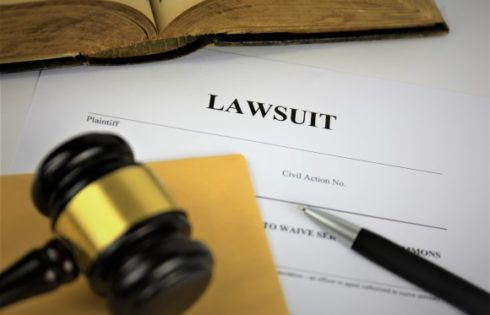
The ACLU once defended rights regardless of ideology. Now it has other priorities
The American Civil Liberties Union, founded in 1920, courageously defended First Amendment rights on campus and elsewhere for several decades. However, following a recent shift in priorities, it has abandoned its mission to protect free speech for all, regardless of politics, ideology, or racial or ethnic background.
Conservatives should note that the ACLU, in its embrace of progressivism, can no longer be regarded as a neutral ally and defender.
In a May 10 article published in The Atlantic, “The ACLU Has Lost Its Way,” law professor Lara Bazelon wrote that the ACLU, “once a bastion of free speech and high-minded ideals…has become in many respects a caricature of itself.”
“Over the organization’s 100-year history, the ACLU’s unique value has been its apolitical willingness to stand up for all speech, regardless of the speaker’s identity, and to stand up for those accused, no matter what the accusation,” Bazelon stated.
The organization’s website still states that it aims “to defend and preserve the individual rights and liberties guaranteed to all people in this country by the Constitution and laws of the United States” (emphasis added).
The ACLU famously defended the First Amendment right of neo-Nazis to march in 1978 in Skokie, Illinois. Though the ACLU’s lawyers undoubtedly regarded their clients as morally abhorrent, they upheld their Constitutional right to free expression and protest.
That may have been the high-water mark of the ACLU’s commitment to defend First Amendment rights indiscriminately.
But that philosophy is theirs no more. The ACLU changed course following the “Unite the Right” 2017 rally in Charlottesville, Virginia, which “culminated in a paroxysm of antisemitic and racist expression and the death of a woman counterprotester,” according to The New Republic.
The ACLU had obtained a court order allowing the offending groups to parade downtown.
The group, regretting its legal support for white supremacists – or perhaps unwilling to be perceived that way – issued new internal guidelines.
The document, entitled “ACLU Case Selection Guidelines: Conflicts Between Competing Values or Priorities,” advised the organization’s lawyers to evaluate potential clients partially on their values, and whether they are contradictory to the ACLU’s own.
In clarification of their values, the document stated that “we are determined to fight racism in all its forms, whether explicit or implicit, and the deep-rooted institutional biases that continue to reify inequality.”
“We are also firmly committed to fighting bigotry and oppression against other marginalized groups, including women, immigrants, religious groups, LGBT individuals, Native Americans, and people with disabilities…speech that denigrates such groups can inflict serious harms and is intended to and often will impede progress toward equality,” the document continued.
Even more, the document stated that “where the ACLU defends the right to speak of those with whom it disagrees, it should generally engage in counter-measures both to reinforce the values the speaker attacks and to make clear that we do not endorse the substance of the views.”
Suggested “counter-measures” include “denouncing” the views with which it disagrees in statements or on social media and participating in counter-protests.
In other words, the ACLU now broadcasts disagreement with its own clients who challenge its progressive priorities, and it supports identity groups counter-protesting against those whose First Amendment rights are in question.
Post-Trump, the ACLU has chosen sides
The ACLU’s “annual reports from 2017 to 2019 highlight its role as a leader in the resistance against President Donald J. Trump,” The New York Times wrote in June 2021.
“But the words ‘First Amendment’ or ‘free speech’ cannot be found. Nor do those reports mention colleges and universities, where the most volatile speech battles often play out,” The Times continued.
“When it comes to the red-hot culture-war issues squarely within its wheelhouse, such as the right to free, albeit hateful, speech on campus, the ACLU has stayed largely on the sidelines,” Bazelon wrote in The Atlantic.
Instead, the ACLU has pursued a progressive agenda.
In October of 2019, the organization joined the NAACP in demanding curricular and hiring changes at the University of Connecticut in response to a racial slur incident on campus. Its demands included “‘requisite First Year Experience course focused on ending racism on campus,’ as well as hiring 10 black faculty and staff and revising the student conduct code.”
In April 2020, the ACLU sued Idaho over a law restricting high school and college women’s sports to biological females.
In May of that year, two female athletes at Idaho State University, represented by the Alliance Defending Freedom, asked “the federal court hearing the ACLU’s case for permission to ‘intervene’ and represent their interests.”
The ACLU also sued the United States Department of Education in 2020 to block Title IX rules revised during the Trump administration that expanded the rights of those accused of sexual assault on campus.
Not surprisingly, The Times stated in its article that “some A.C.L.U. lawyers and staff members argue that the First Amendment, which guarantees freedom of speech and the press — as well as freedom of religion, assembly and petitioning the government — is more often a tool of the powerful than the oppressed.”
College conservatives who need protection of their own speech at institutions hostile to their ideas should seek counsel elsewhere.
MORE: ACLU removes support for campus free speech from statement
IMAGE: EmorySchoolofLaw/YouTube
Like The College Fix on Facebook / Follow us on Twitter






Please join the conversation about our stories on Facebook, Twitter, Instagram, Reddit, MeWe, Rumble, Gab, Minds and Gettr.